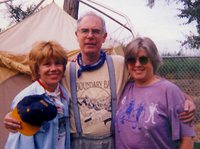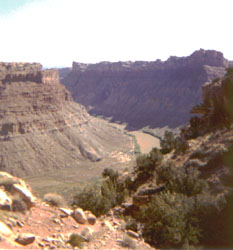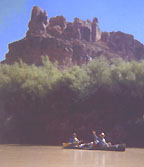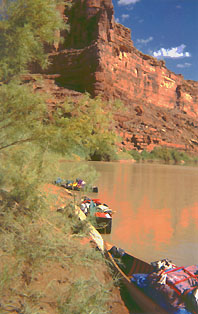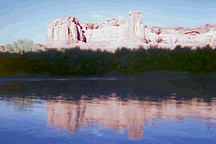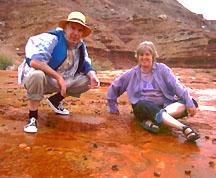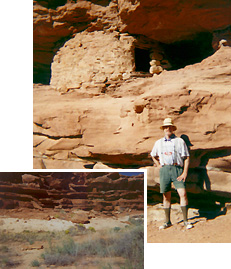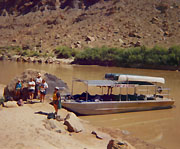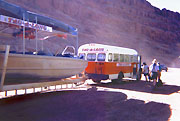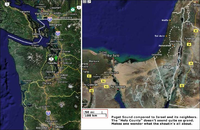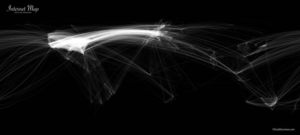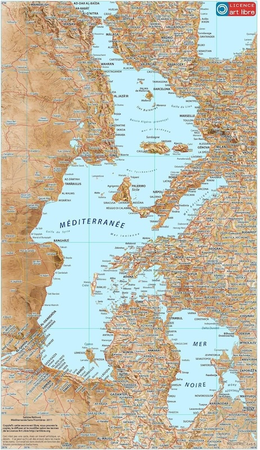
Today on Facebook, someone posted a map of the Mediterranean Sea, annotated in French and unusually rotated with west at the top. It’s a physiographic view overlaid with the names of hundreds of cities of all sizes.
My eye went to the one part of the Med on which I’ve traveled, from Brindisi in the south of Italy, to Kérkera (Corfu) in the west of Greece. And thence the train of memory pulled out of the station.
It was 1980, and I had some time to myself while "between situations" and decided to go to Europe. I bought a Eurailpass, and after a few days of rolling along through Luxembourg, Switzerland, northern Italy and Rome, I arrived by train at Brindisi, a small port on the Adriatic.
The trip from Rome to Brindisi was overnight in a "couchette," a little room in the train with seating for six that could be made into a sleeping space by magically folding the seats and unfolding cots from the two walls, creating six resting places, three on either side, arranged in bunk bed fashion.
With me in the room were
• a former employee of the UN — in Geneva, if I remember correctly — who was traveling with his small daughter to the south of Italy to undertake a new life as a beekeeper; he had been working in an office during the era of the Bader-Meinhoff and Brigade Rosse terror bombings by mail and had decided to give up that work to devote himself to his child; he regaled us for hours on the virtues of honey
• the lovely Gretel M and her traveling companion Tina B, who were touring Europe in the same way as I, looking at the names of towns and cities in a train station and picking a destination on the spur of the moment
•I cannot recall whether or not there was a sixth person, who would have needed to be rather special to compete in memory with the others
We arrived in Brindisi in the morning. The young ladies and I said good-bye to the beekeeper and his daughter, and walked about while we awaited the ferry to Greece. A story for another time.
Time warp! Now it’s a week earlier, and I’m boarding a train from Verona to Venice. It turns out that a first-class Eurailpass ticket does one no good if the first class cars are full, but one can swallow one’s pride and take a second class seat.
Second class on that particular line was open seating in little sets of bench seats facing each other with four places each. I arrived in time to choose my seat on the right facing forward with a large window through which to observe the countryside.
Quickly the car began to fill, and I heard "Sono occupati cuesti…?" — are these seats taken — and I was joined by three young Italian men, with smiles and accommodating gestures all around.
One of the most interesting parts of traveling by train in Europe is "the language negotiation" that occurs at the beginning of a trip, assuming people are in a talkative mood. It quickly becomes apparent which language the most have in common, and that becomes the language of the trip. We four began to introduce ourselves in their Sicilian, my halting Italian, the high school French of one, and my relatively fluent Spanish. The Spanish connection arises, because the dialect of Sicily is very similar to Spanish, to the extent that with a bit of patience they are mutually intelligible. And the train pulled out.
My new friends were Gianni, Roberto and Salvatore, who I learned were construction workers from Sicily, working on a building project in Verona for the summer. We were all on our way to Venice to be tourists. Gianni and Roberto were both worn out from their week’s work, but Salvatore and I began a conversation that lasted most of the trip, whereupon they went their way and I mine. I think he got a kick from the American college professor riding in second class who enjoyed chatting and finding common ground with whomever happened along, probably not an everyday occurrence.
Two days later, as I was walking toward the station to board my train southward, I heard "é, americano!" and turned to see my new amici. We chatted for a moment and said our good-byes. Salvatore handed me a scrap of paper with his address in Sicily. Later in the trip I sent him a postcard, but that was the end of that. The scrap of paper remained — or remains — in the top middle drawer of an old desk at my son’s house; I need to check on that.
Here’s the fun part. Salvatore was clearly engaged with the world, a political person, and our discussions had ranged over many topics of the time, the Vietnam war ("what were you guys thinking?"), terrorism, international affairs, a primer he gave me on Italian politics, etc. Salvatore turned out to be an intellectual, cleverly masquerading as a construction worker.
So today, the map on the Facebook page triggered the memory, so I did a search on his name. It turns out that "salvatore di falco, sicily, sicilia" returns results about several individuals sharing the name, who knew?
One of the results was a page in a Sicilan newspaper, describing the torching of a couple of garbage dumpsters, apparently the result of arson by a political faction aligned with the less savory part of local life in an attempt to intimidate voters. Whose opinion was that? You guessed it: Salvatore di Falco. Whether "my" Salvatore I do not know, but my new flag bears curiosity rampant on a field of green, white and red. It seems entirely in keeping with the young man on the train that he might have become a political leader.
To the original point, each of the players in this little story, if they remember it at all, remembers it differently. If they should ever write down their version and post it on line, some future historian, perhaps an artificial one, may synthesize it into a more complete recitation of the events. Or not. Either way, all hail the WWW!
E se per caso tu fossi il mio Salvatore, per favore scrivimi due righe. É passato troppo tempo.

